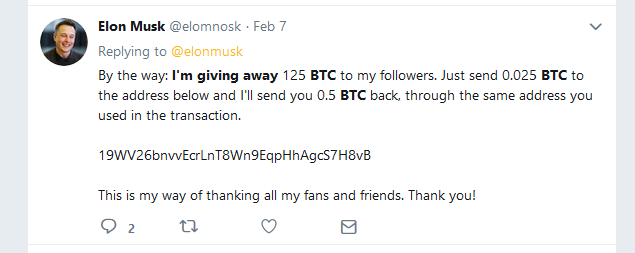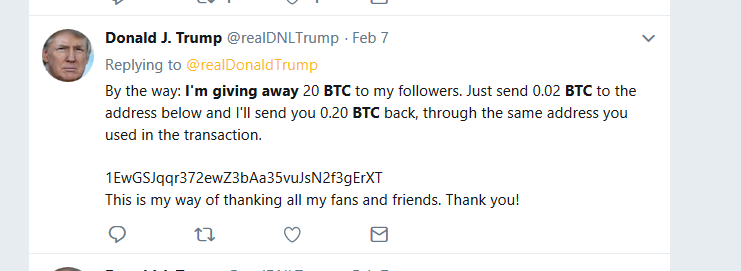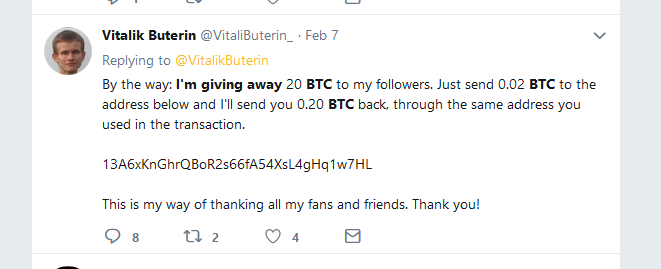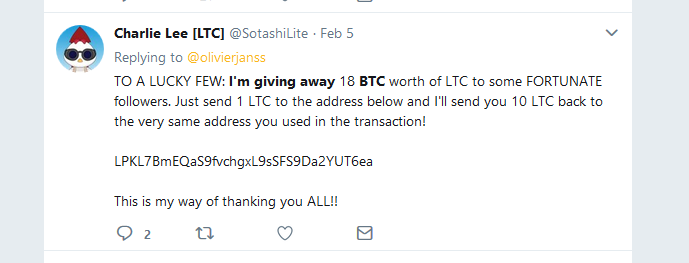Scammers Pretend to be Elon Musk, Donald Trump, Vitalik Buterin on Twitter to Steal Bitcoin
Updated: Feb 09, 2018 at 18:44

Scammers' posts have recently been posted straight under verified updates from Elon Musk, John McAfee, 50 Cent, Vitalik Buterin, Charlie Lee, and major cryptocurrency firms like Coinbase and CoinMarketCap, and even president of the US - Donald Trump. Fraudsters use almost identical usernames to those celebrities in the hopes of being accepted as real.
In a desire to trick fintech fans and get money, cryptocurrency scammers create fake Twitter accounts of famous people and set a lure under their real posts. The lure is just a slight variant of the same pitch – a deal too good to be true.
Let’s look at the fraud case posted under a legitimate statement celebrating the Falcon Heavy rocket launch on Musk’s page, for instance:

When did it come from?
On February 1, fake accounts were noticed spamming the profile of John McAfee, founder of the software company McAfee Associates, and Changpeng Zhao, CEO of Binance, a cryptocurrency exchange that was struggling with technical issues.
"I'm donating 97 Bitcoin to my followers," – said a message, posted under a real tweet by McAfee.
The same text can be found posted by fake accounts of the creator of Ethereum - Vitalik Buterin, and even Donald Trump.

It continued: "First 250 transactions with 0.033 BTC sent to the address below will each receive 0.77 BTC to the address the 0.033 BTC came from. Claim your BTC now!"

A similar note was sent from fake accounts of Charlie Lee, the creator of Litecoin, Roger Ver, and many others:

How could it have happened?
While the majority of the most recent tweets have been using bitcoin in the scam, one more cryptocurrency, Ethereum, was also involved. And even worse, it seems to be working actively.
According to information given by Bleeping Computer, which tracked funds flowing into several wallets, the swindlers have already gotten more than $6,000 from the scheme. The actual number may be higher.
Although phishing-style attacks are still a major threat for individuals transferring money online on the cryptocurrency market, in this case, scammers used a time-proven approach for getting quick money: just asking nicely.
Fraudsters or hackers sending e-mails from PBOC
There are certain suspicions that the letter that several cryptocurrency media outlets received this week, stating that China’s Central bank has plans to regulate all crypto-related activities and businesses in China and Hong Kong, came from a fake or hacked email account, and its author had the intention of manipulating the prices of cryptocoins on the market.
Whoever these fraudsters are, they are taking a new and sad step in crypto-related manipulations and crimes. Coinidol’s team reminds everyone to double-check information before you decide to donate or invest money in any project. Moreover, remember that sharing your private information or information about you cryptocurrency wallet may be a trap.
News
News
Coin expert

(0 comments)